- Administrator
- Albums and Singles
 21 years ago Steven Stapleton was invited to swing by BMS Studios inLondon late one night by resident engineer Nicky Rogers. Stapletongathered up friends John Fothergill and Heman Pathak and made somerecordings with a few goals in mind: very long tracks and no vocals -they hated songs. With the eye catching infamous artwork a classic wasborn, pressed in a limited quantity of 500 (probably because thereweren't enough fans or enough money to make more). It was actuallyquite buzzworthy around London and reviews did pop up around town(maybe not the most favorable) but people were interested in the wackcover artwork at least. In retrospect, it's a bunch of sloppy noisemade by three drugged-out naive kids who were frustrated doing boringjobs of making signs for example, bringing a ton of noisy toys into thestudio. Do I hear a Merlin in here? Loads of wanky guitars color thefirst side of the LP while the second side consists of morenon-conventional noisemakers and randomness. The beauty is that theseguys weren't taking themselves nearly as seriously as modernimprovisationalists, there was indeed an element of purity apparent.None of the tracks really end up where they started, and might servethe purpose of being a great soundtrack to a drug-influenced evening.This album provides an excellent reference point, and the newlyreleased repackage has a complete booklet with old photos of theoriginal trio, a restored front and back cover and even a letter froman A&R Rep at Epic Records in NYC asking to hear some more NWWrecords. (Imagine a world with NWW signed to Epic!) Anyhow if thatwasn't enough, the music's been cleaned up from the analogue tapes andthere's a bonus 15+ minute track recorded in September with Tibet andColin Potter. What's a new track doing on an old reissue? In a strangejustification it belongs, as the track consists of Tibet reading thatfamed list of influencors from the original sleeve, over a minimalamount of sound. It's nothing too impressive but mildly amusing andneat to have an archive of (pretty much like the rest of this record).While the new edition is a nice thing to own, if you're not all thatconcerned with new packaging or a new track, this might not be worthyour cashola. On the other hand if you never picked it up, there's nobetter time than the present. Once again I must state that I wouldpersonally like to see 'Insect and Individual Silenced' and 'AutomatingVol. 2' surface on CD before more reissues like this and 'ThunderPerfect Mind' materialize.
21 years ago Steven Stapleton was invited to swing by BMS Studios inLondon late one night by resident engineer Nicky Rogers. Stapletongathered up friends John Fothergill and Heman Pathak and made somerecordings with a few goals in mind: very long tracks and no vocals -they hated songs. With the eye catching infamous artwork a classic wasborn, pressed in a limited quantity of 500 (probably because thereweren't enough fans or enough money to make more). It was actuallyquite buzzworthy around London and reviews did pop up around town(maybe not the most favorable) but people were interested in the wackcover artwork at least. In retrospect, it's a bunch of sloppy noisemade by three drugged-out naive kids who were frustrated doing boringjobs of making signs for example, bringing a ton of noisy toys into thestudio. Do I hear a Merlin in here? Loads of wanky guitars color thefirst side of the LP while the second side consists of morenon-conventional noisemakers and randomness. The beauty is that theseguys weren't taking themselves nearly as seriously as modernimprovisationalists, there was indeed an element of purity apparent.None of the tracks really end up where they started, and might servethe purpose of being a great soundtrack to a drug-influenced evening.This album provides an excellent reference point, and the newlyreleased repackage has a complete booklet with old photos of theoriginal trio, a restored front and back cover and even a letter froman A&R Rep at Epic Records in NYC asking to hear some more NWWrecords. (Imagine a world with NWW signed to Epic!) Anyhow if thatwasn't enough, the music's been cleaned up from the analogue tapes andthere's a bonus 15+ minute track recorded in September with Tibet andColin Potter. What's a new track doing on an old reissue? In a strangejustification it belongs, as the track consists of Tibet reading thatfamed list of influencors from the original sleeve, over a minimalamount of sound. It's nothing too impressive but mildly amusing andneat to have an archive of (pretty much like the rest of this record).While the new edition is a nice thing to own, if you're not all thatconcerned with new packaging or a new track, this might not be worthyour cashola. On the other hand if you never picked it up, there's nobetter time than the present. Once again I must state that I wouldpersonally like to see 'Insect and Individual Silenced' and 'AutomatingVol. 2' surface on CD before more reissues like this and 'ThunderPerfect Mind' materialize.
samples:
Read More
- Administrator
- Albums and Singles
Mark Nelson (Pan American), Frank Bretschneider (Komet) and Joe Kingman (Fisherofgold) are given only one restriction for this project: approximately 15 minutes apiece to subjectively express themselves. I wonder why only 48 minutes total when most discs and players can accommodate 75-80? That question aside, volume 1 of this artist friendly series from Quatermass is a solid collection of complementary tracks.Pan American's "Train Station" and "The Passage" continue laying track beyond last year's delicious "East Coast Bugs" 12" on BSI. The latter in particular builds up a strong, pulsating head of dub steam with no time to pick up passengers 'til the end of the line. Komet specializes in economic titles, sounds and structures. His 3 tracks - "Stab", "Eist" and "Pass" - repetitively but progressively pop, click, boom and hiss, much like the digital 'pop' of his own "Rand" and "Curve" discs on Mille Plateaux. Fisherofgold uses nearly all of his allotted time for a single track. "Lapis Lazuli" (a semiprecious gemstone in varying shades of blue) evokes more of a golden than blue feel for me. Tiny ball bearings tumble around in a cement mixer as delicate rips and tears of audio are smeared about and a 7 note bass line loops. A languorous trip hop beat kicks in but is snuffed out within a few minutes. By the 9th minute it has slipped into a very comfortable and pretty groove adding a strummed accompaniment. And in the remaining time Kingman carefully strips away the elements 'til it comes to a sudden stop. I bought this disc for the Pan American and Komet but the Fisherofgold is best, though only marginally so as they're all quite pleasant. Now I wonder who will be on volume 2 ...
samples:
- Pan American - The Passage
- Komet - Pass
- Fishertogold - Lapis Lazuli
Read More
- Administrator
- Albums and Singles
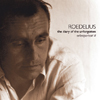 The sixth album in his Selbstportrait series, this is one of the best. Hans-Joachim Roedelius created this mini-masterpiece during the mid '70s, drawing on various recordings from his career at that time and building on them with added instrumentation and a wider selection of tones, structures and styles. The end result is a dazzling mix of old and new material (well it is all old at this stage considering the age of the album) which gives Roedelius’ talent the spotlight it deserves.
The sixth album in his Selbstportrait series, this is one of the best. Hans-Joachim Roedelius created this mini-masterpiece during the mid '70s, drawing on various recordings from his career at that time and building on them with added instrumentation and a wider selection of tones, structures and styles. The end result is a dazzling mix of old and new material (well it is all old at this stage considering the age of the album) which gives Roedelius’ talent the spotlight it deserves.
While not a break from the dreamy textures of his more famous works with Cluster and Harmonia (not surprising considering he recycles a lot of studio debris from various album sessions), the pieces that make up The Diary of the Unforgotten show a more intimate side to Roedelius’ musical personality. The rolling rhythms of "Frohgemut" conjure up images of a babbling brook where the water has been replaced with a rainbow; the playful side of Roedelius’ work that peeps through the starker aspects of his music in evidence here. In contrast, the almost classical piano of "Du," which immediately follows "Frohgemut," has more in common with Popol Vuh or even Debussy. The beautiful piano playing is stark naked in comparison to the synthesizers that populate the rest of The Diary of the Unforgotten.
A large proportion of The Diary of the Unforgotten is given over to "Hommage à Forst," a labyrinthine exploration of beats and rhythms that should be instantly recognizable to any student of Krautrock. Many of these backing tracks are taken directly from Cluster and Harmonia pieces and it is hard not to start humming or singing the absent but familiar melodies. Roedelius uses these backing tracks as a springboard for some studio jamming, even bringing in the most unusual instrument of all (for him): an electric guitar. A wobbly echo effect transmutates the loose guitar playing into a strange, organic counterpart to the mechanical rhythms.
The Diary of the Unforgotten is certainly one of Roedelius’ finer solo releases. It is Roedelius’ experiments with his approach to composing and playing around these familiar elements which make the album and the bits lifted from Cluster and Harmonia songs are the least exciting parts here. The idea of this being an audio self-portrait is most apt as Roedelius’ character shines through with a brilliance that is almost blinding.
samples:
 
Read More
- Creaig Dunton
- Albums and Singles
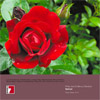 Recorded live as a duet between turntables and keyboards (with editing and overdubbing bass added later), the main track here is a slow, dramatic piece, with the flip side conjuring the best moments of electronic dub.
Recorded live as a duet between turntables and keyboards (with editing and overdubbing bass added later), the main track here is a slow, dramatic piece, with the flip side conjuring the best moments of electronic dub.
While artists who specialize in the use of a turntable as an instrument are a dime a dozen, no one else really uses the device as creatively or as intensely as Jeck.Truly "playing" it, rather than just using it as a way to sample or scratch records, he coaxes sound out of the players that bear little or no resemblance to the source material."London Tenderberry" is a piece of slow drama that has no overt "record" sounds in it:shimmering synth pads, reverberated bangs and crashes, and a gurgling bass pulse meet to create a flowing river of opaque sound.The flip side, "Tenderberries Version" is not an ironic title at all, cutting the mix from the previous side up into throbbing bass and electronic synth pulses, leading to a complex variety of tone and rhythm, but with an intense dub sensibility that stands with the best of the genre.
Within the confines of a 7-inch record, I must admit that this is a case where less isn’t more.Sometimes a project or specific work is best kept within a sub-12 minute space, where it is able to make its statement without becoming stagnant or repetitive, but that's not this record.The complex nuances of the A side and the electro-like bass heavy flip just left me wanting more.Which is, I assume, the best compliment I could give.
Read More
- Creaig Dunton
- Albums and Singles
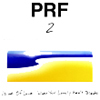 Following up their four track debut (originally titled 4), here are two additional tracks from the former Clockcleaner vocalist's sideproject. Again, it is an exercise in unabashed goth revivalism, encapsulating the sensibilities of the genre without sounding like a tribute band or an overly derivative project. Here is simply two additional songs, following the mold set forth on the previous EP, of quality death rock with a modern influence.
Following up their four track debut (originally titled 4), here are two additional tracks from the former Clockcleaner vocalist's sideproject. Again, it is an exercise in unabashed goth revivalism, encapsulating the sensibilities of the genre without sounding like a tribute band or an overly derivative project. Here is simply two additional songs, following the mold set forth on the previous EP, of quality death rock with a modern influence.
With Clockcleaner, John Sharkey III always kept that early goth/new wave torch burning with his vocals and guitar work, but there it was often buried under a scum rock veneer, hiding the oft gentle sensibilities with Cro-Magnon street punk violence.With his solo work as Puerto Rico Flowers, there’s no obscuring this part of their sound."Voice of Love" goes the traditional path, with big, crashing drums and dour synthetic strings leading the darkened way, with overdriven fuzzed out bass laying the foundations.Flipside "When Your Lonely Heart Breaks" is a slow, lurching bass and drum zombie, meandering through with mantra-like repetitive vocals.While repetitive, it stays more hypnotic rather than getting boring, and the synth flourishes at the end only help the sound.On both tracks, Sharkey’s melodramatic, monotone vocals are reminiscent of almost any old school goth band, but no one in particular.
For all its unashamed sepulchral vocals and smeared black eyeliner, PRF probably is the most unassuming project for such classic death rock styling, both in name and imagery.I’m sure that’s how the famously sarcastic Sharkey wants it though. Pushing aside tired metaphors of books and their covers, this is a fresh alternative to simply replaying those old Bauhaus and Sisters of Mercy albums all the time.
Read More
- Administrator
- Albums and Singles
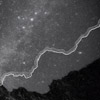 While both of these artists have significant discographies in their various projects (Marcia Bassett is a member of Double Leopards and Hototogisu, while Jenny Gräf is half of Metalux), here in the context of a duo they've chosen to examine more varied and ambient sounds as opposed to the more noise and drone tinged works their other bands are known for.
While both of these artists have significant discographies in their various projects (Marcia Bassett is a member of Double Leopards and Hototogisu, while Jenny Gräf is half of Metalux), here in the context of a duo they've chosen to examine more varied and ambient sounds as opposed to the more noise and drone tinged works their other bands are known for.
The long opener "Zero as Sky" begins with a slow moving wave of buzzing drone which, to use a contemporaneous pop culture reference that will be meaningless in six months, sounds like the vuvuzelas that have been a locust in the media since their World Cup appearance this summer.The droning horn sounds are paired with overt guitar to create an odd duet, which takes an even more drastic turn when the layered, but otherwise untreated vocals appear.The piece transitions to deliberate guitar feedback and warbling birdsongs in a minimal, but tightly controlled mix.
The shorter middle segment, "Black Waters Glow" is perhaps the most inviting of the three pieces here.The pure, unprocessed guitar and bits of synth, when put alongside the lightly effected vocals give a very distinctive 1970s prog rock sound, at least in its approach.The track is far from the overblown pretense of that genre, and remains a rather sparse, low-key work throughout, with even the electronic elements kept to a minimum throughout to emphasize the guitar and vocal components.
The duo isn’t content to stay in these sparser, warm waters for long.The closing "Phantasmagorical Mapping" heads back into dark, mysterious realms.The treated static and low end swell that form the introduction pull away to leave the focus on bass drone and tremolo-ed guitar noise, which form the underlying skeleton of the piece.Percussion arrives, but in an erratically paced form that sounds more like a cassette tape being eaten by the machine.The low register elements swell to the point of raw clipping, but stay restrained and controlled.Even once the spacy electronics appear in the later moments, there is still a sense of lurking menace in the track that is only slightly lightened by the delicate vocals that close the track.
Peradam is not a light album by any means, but it does step away from the usual doom and gloom associated with this type of music.Instead, it embraces a world of texture and variation, using the similar paints of doom and drone, but in a different and varied way, developing a more dynamic style throughout.While it doesn't specifically resemble any of Bassett's other projects, her presence is definitely felt throughout.
samples:
 
Read More
- Administrator
- Albums and Singles
 As a follow-up to his last full-length solo album Northern, Deupree has once again captured the changes in seasons in an audio format. Rather than the vast expanse of ice and snow, Shoals is the sound of summer’s transition into fall, of weather-worn trees decaying and other vegetation making early preparation for the coming change.
As a follow-up to his last full-length solo album Northern, Deupree has once again captured the changes in seasons in an audio format. Rather than the vast expanse of ice and snow, Shoals is the sound of summer’s transition into fall, of weather-worn trees decaying and other vegetation making early preparation for the coming change.
Deupree utilized a variety of gamelan instruments from Java and Bali as the core of this project, not playing them traditionally but using their surfaces and construction as a means of creating sound.These sounds were recorded and then looped and digitally manipulated via computer, creating a hybrid of ancient organic and modern sounds.The results do not clearly bear the mark of either, instead representing a microcosmic world of music that balances abstraction and melody.
The title track hides melodic tones behind the soft creaking of wood, cut into rhythmic loops and then garnished with the occasional metallic clang, often reduced to a simple blip.Amongst the warm haze of decaying sound, there is the sound of natural movement:Deupree's movement amongst the instruments and microphone arrays during the recording sessions was captured by the recording devices.These "imperfections" in sound were treated as important as any of the other instruments, giving an even more human quality to a style that is often criticized as being too technologically focused.
The carefully restrained clatter of "Falls Touching Grasses" allows the stringed and percussive instruments to show through a bit of their natural color, but kept hushed and subtle, mixed among the pulses of fragmented sound.The combination of the almost collage-sounding dynamic bits and the distant reverberated notes creating a melodic counterpoint works quite well.The extremely textural "Rusted Oak" sounds as if it is hiding an acoustic guitar among its tactile layers, with the most subtle of percussion off in the distance.Of all the pieces, this one has the most natural sound, almost as if it were a field recording of an undiscovered land, complete with the sounds of a tree decaying to construct a relatively bleak sounding track among lighter ones.
While Deupree is a prolific artist, his full length solo albums are relatively infrequent.When they appear, they are as well developed and conceived as any modern composer.His work coaxes the most beautiful threads of sound out of natural and man-made sources and then weaves other-wordly textures with them, and uses them to create worlds that are inviting and compelling.Shoals is no exception to this, and perhaps is one of the best demonstrations of his strengths and creativity.
samples:
 
Read More
- Administrator
- Albums and Singles
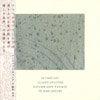 This isn't the first collaboration between these two that serves as excellent hot weather listening. While a lot of Andrew Chalk's recordings can seem dark and cold, this short release is serene in a very warm and comforting, almost blindingly bright way.
This isn't the first collaboration between these two that serves as excellent hot weather listening. While a lot of Andrew Chalk's recordings can seem dark and cold, this short release is serene in a very warm and comforting, almost blindingly bright way.
 
Originally released on vinyl in the summer of last year, and presented as an extended play single, these three pieces total less than 25 minutes, and while the collaborators have chosen to present the recordings in these versions, the fade-outs suggest there's more to them than what we're given.
There's a lot of movement in the stillness here. The faint rhythms on "Queen of Heaven" are only a backdrop to the very prominent sustained layers of keyboards and almost inaudibly low frequency bass. It's like watching the wind blow through tall blades of grass under a stale, mean, and old sun in the mid-afternoon. It's that time that is hottest and brightest before the sun begins to set. All the tall blades hold solid in their ground and sway elegantly, mimicking a water-like ripple with even the slightest breeze. While the instrumentation differs significantly from "Pale Shadow" (from 2007's Ghosts On Water) the hot and bright feeling achieved here is quite familiar.
The second piece, "Of Beauty Reminiscing" is more blatant on a few levels. It not only shares a title with a Vikki Jackman long player, it also incorporates some of Suzuki 's familiar cricket sounds, like those used on "Fuxen" from Chalk and Suzuki's first collaborative release, The Days After, released in 2003. These crickets, however, are faster and livelier, much like crickets heard at dusk. They make the ones from "Fuxen" sound like night time crickets about to fall asleep. Regardless, there's more melodic development here than on the early collaborations, and it continues through the closer, "The Water Clock," which, once again, has very prominent keyboard and bass, with a surprisingly loud, even pinching analog synth melody. It also features piano by Vikki Jackman and a stringed instrument (probably a guitar) being faintly plucked, almost Jandek-like, naked, and uncompressed. But these instruments only add a slight seasoning to the periphery.
I enjoy that the two have, for the most part, pared down their instrumentation, focusing more on what they have and what to do with it. They don't toss as many sources in as they have in previous sessions—there's no singing nor random piano banging this time around. Its brevity is a tease, unfortunately, as I could easily listen to much longer versions. In turn, I found myself repeating the album while doing late afternoon/early evening work in the recent hot weather.
samples:
Read More
- Administrator
- Albums and Singles
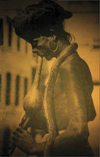 Originally released in 2005 as a small run CD-R, this album has been given a much needed reissue (albeit only as a limited edition cassette). Slightly remixed, this version also includes a bonus track and new artwork. Simultaneously putting me at ease and on edge, the music is in a constant flux of emotional and sonic content. This is one of Anthony Mangicapra's more fulfilling releases from his early works and it sounds as fresh now as any of his current output.
Originally released in 2005 as a small run CD-R, this album has been given a much needed reissue (albeit only as a limited edition cassette). Slightly remixed, this version also includes a bonus track and new artwork. Simultaneously putting me at ease and on edge, the music is in a constant flux of emotional and sonic content. This is one of Anthony Mangicapra's more fulfilling releases from his early works and it sounds as fresh now as any of his current output.
Acid Casualty Productions
 
Upon pressing play on side A, I am immediately plunged into an unfamiliar environment as Mangicapra brings his listeners on a voyage through the hull of an ancient and huge ship. The sounds running through "The Purifying Order" and "Torment of the Metals" are vast, echoing through the hollow body of this imaginary vessel. Suddenly, with "Iao Habdomai," we are dropped into the center of a ritual being played out through music, the words of the spell intoned by shimmering cymbals. The effect is heady and invigorating, the feeling of some beneficent power being summoned runs through the piece, dispelling the unease previously evoked by the preceding tracks.
On side B, the music takes a different turn as foggy noises emerge from the tape. Unlike the rest of Asha Dasha, "Prepetuum Mobile" is an obviously threatening piece, waves of chilling tones running across the piece like foreboding winds; reptilian shrieks occasionally cutting through the murk, sounding too close for comfort. The bonus track, "Its & It’s," caps off the album, a burst of loudness to counter the relatively sedate sounds that made up the original album. The off-white noise that erupts from the speakers exorcises any entities that might have latched on during playback of the album before fading into nothing.
As regards the remixing of the album, there is not a huge difference between the original version of Asha Dasha and this one. Duane Hosein’s contributions have been removed but I would be hard-pressed to discern where the changes have occurred. Bearing in mind the ritualistic edge of Hoor-paar-Kraat’s music, I would wager that Hosein’s contributions were as much to do with the atmosphere as they were with the recording process. Yet all this is just trivia as Asha Dasha is still a major milestone in Mangicapra’s evolution as Hoor-paar-Kraat.
 
Read More
- Administrator
- Albums and Singles
Christopher Willits Prepares New Full-Length for Ghostly International: Tiger Flower Circle Sun
ARTIST: Christopher Willits
TITLE: Tiger Flower Circle Sun
LABEL: Ghostly International
FORMAT: CD/LP/Digital
TRACKLIST:
01. Portal
02. Sun Body
03. Sunlight Is You
04. Green Faces
05. Uplifting The Streets
06. Plant Body
07. New Life
08. The Hands Connect To The Heart
09. The Heart Connects To The Head
10. Intend-Evolve
11. You Are Always Surrounded By Stars
12. Subconscious Transmission
13. Light Into Branches
14. Branches Into Flowers
15. Flowers Into Stardust (CD/Digital Bonus)
Christopher Willits occupies a unique corner of the electronic-music universe—hovering above the intersection of electronic production’s nuts and bolts and a wide-open creative mind. “I am a conduit of the process, a kind of gardener,” he says. “I simply imagine, intuit, respond and do the work laid before me.” Willits’ tireless responding and doing and working has produced 20 albums in 10 years—solo and in collaboration with artists including Ryuichi Sakamoto on 2008's Ocean Fire —and an organic, multi-faceted sound that expands like the vines of an electro-acoustic kudzu plant. Christopher Willits is a label owner (the experimental hub Overlap ), a meditator, a tech geek, an audio/visual artist, a teacher (he's hosted the series "What You Talkin' About Willits?" on XLR8R.TV since 2008), and virtuosic musician in one. In other words, there's no one out there quite like him.
Willits’ 2nd full-length on Ghostly International, Tiger Flower Circle Sun, is his most technologically complex yet—it's also his most organic, drifting skyward in a swell of ambient hums and subtle polyrhythms. With an imagination as blissfully overactive as our friend Willits', the only place to go is up. Tiger Flower Circle Sun arrives on July 26th in Europe and July 27th in North America.
Read More
- Administrator
- Albums and Singles

UK release date: July 5, 2010
US release date: July 20, 2010
Disc One
1. In the Art of Stopping - 3:34
2. Mr Marx's Table - 3:02
3. Being Watched - 2:57
4. Comet - 3:17
5. The Agfers of Kodack - 3:11
6. Nice Streets Above - 3:45
7. Spent - 4:43
8. Read and Burn - 2:34
9. You Can't Leave Now - 3:41
10. Half Eaten - 1:58
11. 99.9 - 7:42
Disc Two
1. I Don’t Understand
2. Trash/Treasure
3. Raft Ants
4. Germ Ship
5. 1st Fast
6. Artificial Gravity
7. Dj Fuckoff
8. 12 Times U
9. Our Time (Minimal Mix)
10. Desert Diving (Alternate Mix)
11. 12 Times X
Send Ultimate is an archaeology of Wire in the studio between 2000 and 2003--a period during which the band worked on new music for the first time in a decade. This retooled edition of Send gives fresh insight into an exciting chapter for Wire, expanding the frame around the album and providing a larger context with rare and previously unheard material. The double-CD includes both sides of the 12 Times U vinyl-only collectors item (the '12XU' remixes that catalyzed Wire's Send-era burst of creativity); unreleased curiosities such as 'DJ Fuckoff,' an exercise in hyperkinetic dancefloor lunacy; alternate versions of numbers originating in this period that subsequently appeared on 2007's Read & Burn 03; and the tracks from the first two (out-of-print) Read & Burn EPs that were omitted from the original Send.
Read More


